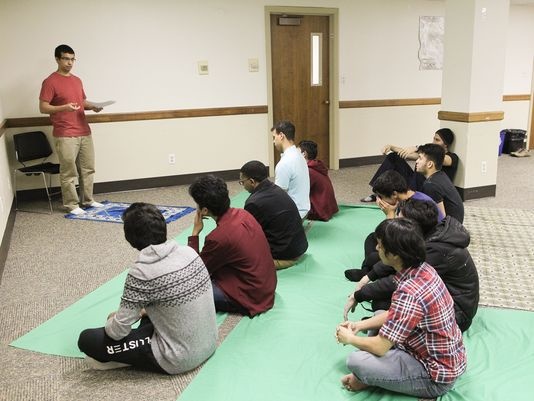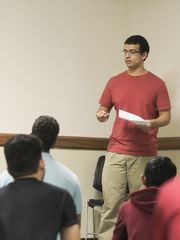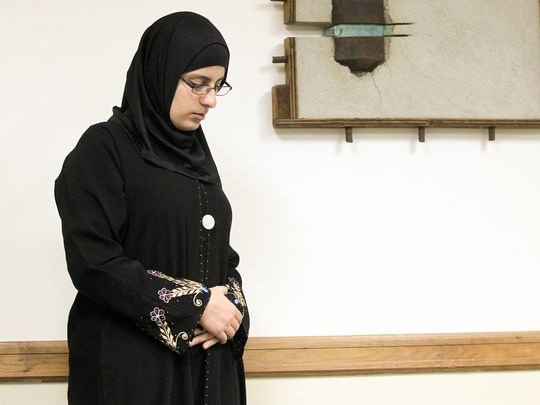By Jeff Charis-Carlson, The Des Moines Register

Mohammed Ismail leads a prayer service with the University of Iowa Muslim Student Association in the Lucas Dodge Room at Iowa Memorial Union Friday, Nov. 20, 2015. (Photo: David Scrivner / Iowa City Press-Citizen)
As the call to prayers began in Arabic on a recent Friday, a handful of people already had gathered in a room at the Iowa Memorial Union.
The room was emptied of tables and chairs. Rugs and blankets had been brought for the Muslim students to kneel on. People trickled in over the next half-hour, most with backpacks in tow, some wearing sweatpants and out of breath. Shoes and other belongings were propped against the rear wall.
By the time the sermon began, about three-dozen men and one woman were in place to hear Mohammed Ismail's counsel on how to focus their minds during the Salah.
"It's hard for us to give our full devotion to (Allah) during the Salah," said Ismail, a University of Iowa biochemistry major and event coordinator for the UI Muslim Student Association. "We might think of ... our plan for the day, our classes, exams ... It is our duty as Muslims ... to give Allah our full devotion and to concentrate on him."
But that devotion and concentration doesn't come easy without a dedicated place to pray.
Muslims at all three regents universities are working to find a permanent place to perform their daily and weekly religious obligations. Having an assigned space on campus, they say, also would give non-Muslims a place to learn about a religion they may know only through news coverage of international terrorist attacks.
"If someone wants to know something about Islam, especially with all the controversy going around the world right now, it would be nice to have an address (on campus) where people could come to ask, 'What do you guys think about this? What do you guys think about that?' " said Mohamed Othman, a UI sophomore.

Mohammed Ismail leads a prayer service with the University of Iowa Muslim Student Association in the Lucas Dodge Room at Iowa Memorial Union Friday, Nov. 20, 2015. (Photo: David Scrivner / Iowa City Press-Citizen)
The Salah is one of the Five Pillars of Islam, considered the framework for Muslim life. The Lucas/Dodge Room in the union works well for the student group's Friday afternoon prayers because it fits everyone comfortably and the abstract art on the walls doesn't detract from the prayers. But despite efforts to book the room early and often, the group sometimes has to meet in smaller or otherwise inadequate rooms on campus.
"Sometimes we barely make it to the prayers because the rooms change," Othman said.
Motier Haskins, faculty adviser to the student group, said he has a meeting scheduled this week with Tom Rocklin, UI's vice president for student life, to bring up the topic once again. Although discussions with administrators about a dedicated space in the past have ended without sufficient action, Haskins said he remains "always optimistic."
“There is a saying, ‘Allahu Alam — Allah knows best,' ” Haskins said. “We leave that in the hands of God. If it is supposed to happen, it will happen.”
Not-so neutral options
The national Muslim Student Association has been working for years with campus organizations to seek various accommodations at public universities across the country.
The national association usually advises students to call first for a neutral prayer area that would be made available to all religions on campus, if no such space exists.
“In any public institution, it’s very important for them to consider not only the needs or the wants of one religious group, but to represent all students and all different religions,” said Uzair Siddiqui, project manager for the national group.
If there are spaces already on campus for Christian or Jewish groups, for example, then the national group encourages local chapters to ask for similar spaces for Muslims, Siddiqui said.
But prayer areas offered on public campuses aren't always perceived as religiously neutral. Often, the growing number of Muslims at public universities doesn't have as much access as Jewish and Christian students to already established campus ministries.
Moreover, many Muslim students, faculty and staff feel tension on campus as they seek discrete places in which to offer their five daily prayers, at dawn, noon, afternoon, sunset and night.
“We have students who go down into the engineering basement … or go behind the fifth-floor staircase to pray there,” said UI graduate student Moustafa Ibrahim. "It’s mainly because they are trying to find a place where there’s not much traffic so they don’t get weird looks from people.”
Most non-Muslims walk by such prayers with, at most, a puzzled expression at watching people whose prayers encompass standing, bowing, prostrating themselves and ending while sitting on the floor. But there have been occasions in which some students have tried to interfere — even challenging a Muslim's right to pray publicly.
“It gets awkward,” Ibrahim said.
Many groups seek space

University of Iowa Ph.D. student Widad Abdalla participates in a prayer service with the University of Iowa Muslim Student Association in the Lucas Dodge Room at Iowa Memorial Union Friday, Nov. 20, 2015. (Photo: David Scrivner / Iowa City Press-Citizen)
UI officials say they work to accommodate a variety of space requests from spiritual and faith-based student groups. Once recognized by the university’s Student Organization Review Committee, the groups can reserve facilities at minimal or no cost.
“Upon registration and approval, we have an obligation to assist every organization to carry out their mission, and those missions differ from group to group,” said Bill Nelson, UI's director of the Iowa Memorial Union and Center for Student Involvement and Leadership.
In addition to the Muslim Student Association’s standing reservations for Friday afternoon, the union regularly provides space for other spiritual and faith-based student organizations. Danforth Chapel also is available to reserve and is left open for quiet reflection during most of the day.
“Groups that are not comfortable with the cross and the linens (in the chapel) can move that aside,” Nelson said. “That is common practice for that space.”
Sense of community
Haskins, a UI clinical associate professor of social work, said he has tried to find a more permanent site for UI’s Muslim population since he came to the university in 2007. Around that time, UI administrators made Danforth Chapel available for daily prayers, which Haskins said seemed an ideal solution.
“We know that space is an issue at the University of Iowa,” Haskins said. “Everybody is looking for space. … So we were willing to take what they offered. It was private, it was clean, and it was as centrally located as possible.”
But after a handful of gatherings, it became obvious the chapel, with benches, an altar and a cross, was anything but a "neutral" religious space. It simply wasn't going to work for a group whose members spread out rugs and blankets to sit, kneel and stand on during prayers.
The Iowa City Mosque, about 2 miles from campus, also isn't a viable option for daily prayer, Haskins said, because too few of the students have cars or other transportation.
Students have created ad hoc spaces for gatherings over the years, from empty classrooms to the food court in the Old Capitol Town Center. But Haskins said such temporary arrangements undermine the sense of Ummah, or community, that is a central aspect of the Salah.
Haskins estimates if there was a permanent site assigned on campus, the 40 people who come to weekly Friday prayers at UI would double or triple.
“A lot happens in that space,” he said. “It’s community. It’s bonding. It’s loving. It’s a place that is supportive and nurturing no matter where you were born in this world.”